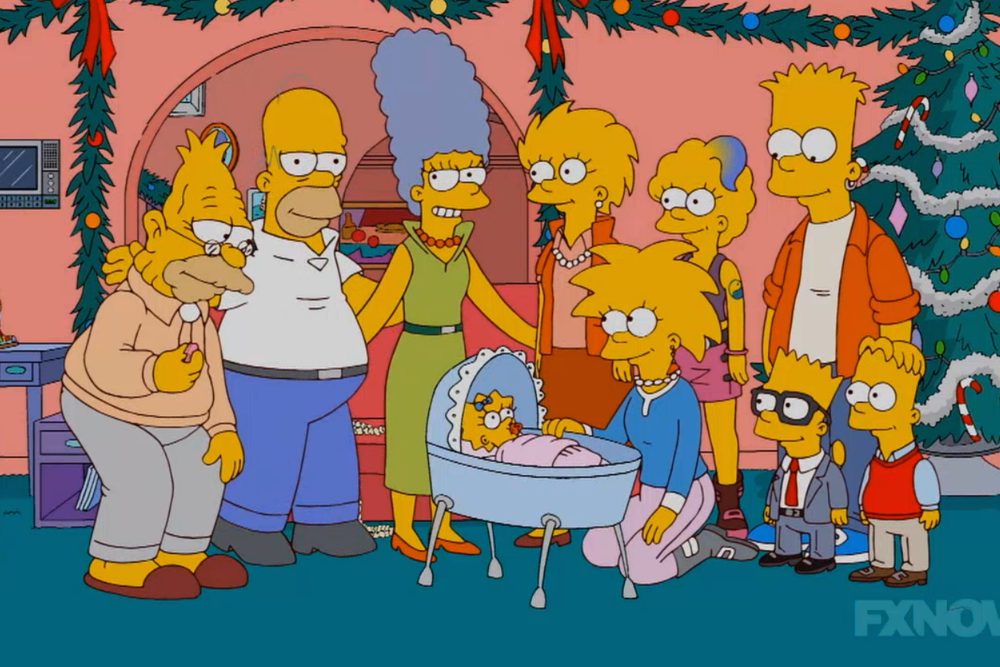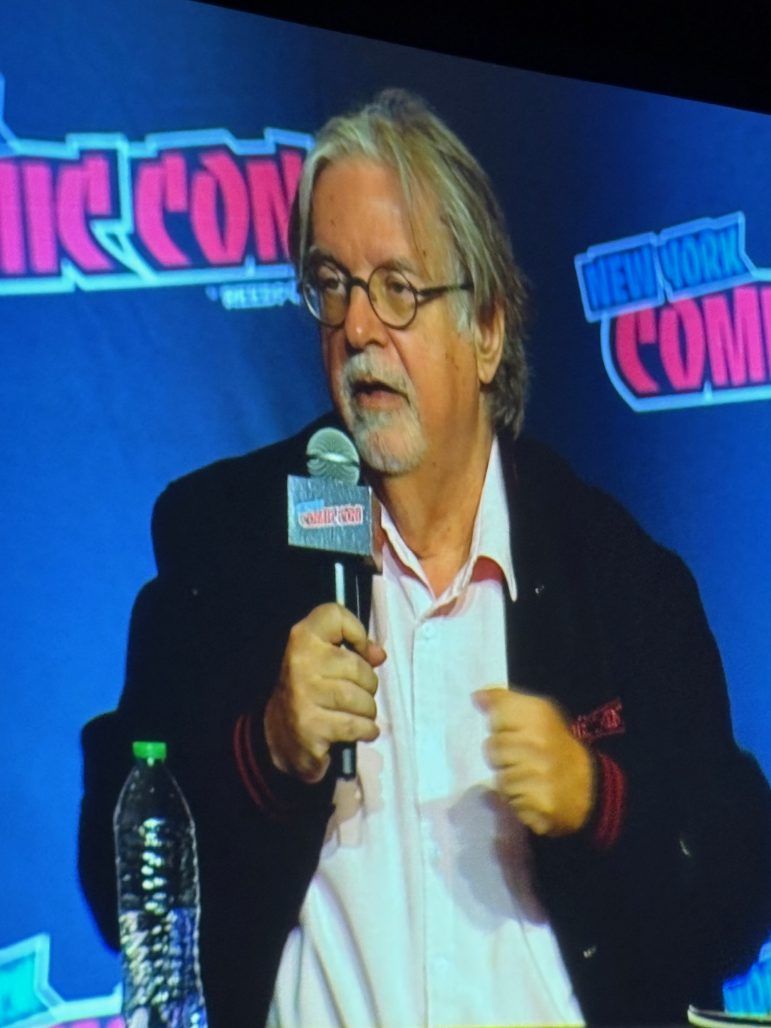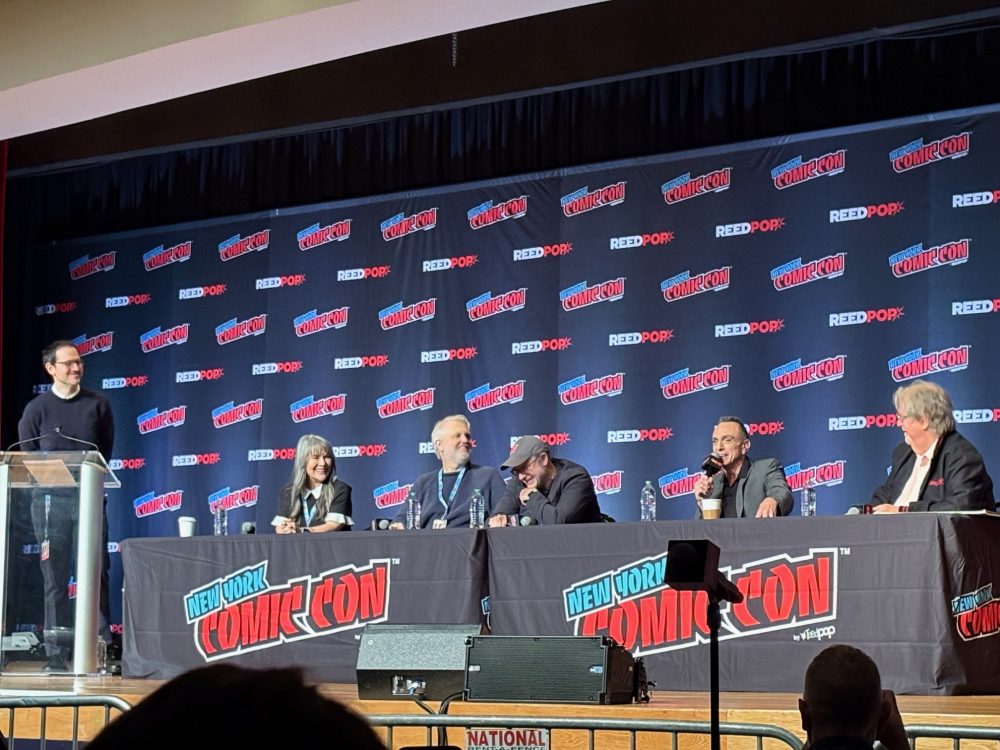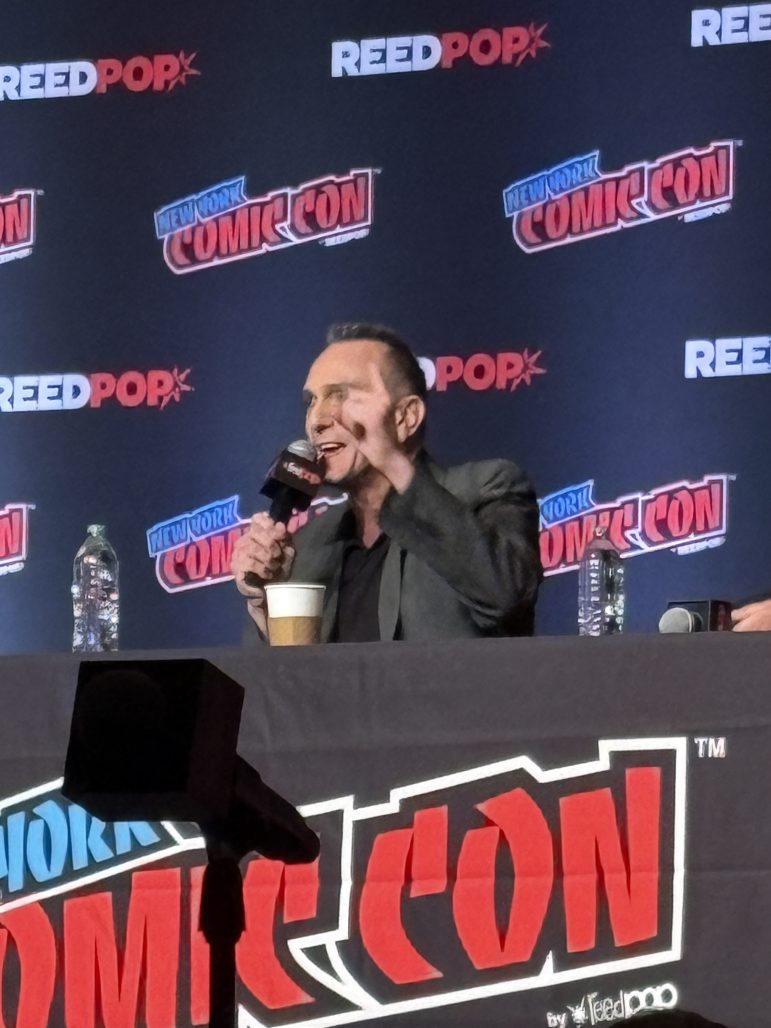The groundbreaking and highly influential animated adult sitcom The Simpsons has amassed millions upon millions of fans since its debut in 1989, so it was no surprise that hundreds of them came in droves to a packed presentation at the New York Comic Con Main Stage on Saturday.
While there have been several Simpsons panels at San Diego Comic-Con (Comic-Con International) over the years, this was the first such panel for New York City. The panel was moderated by Vulture writer Jesse David Fox, and featured series creator Matt Groening alongside voice actor Hank Azaria (Moe, Chief Wiggum, and countless more characters), showrunner and executive producer Matt Selman, and writers/co-executive producers Tim Long and Carolyn Omine.
 A shot from The Simpsons’ hypothetical “series finale”Du
A shot from The Simpsons’ hypothetical “series finale”DuAs befitting The Simpsons‘ 35-year history of subversive and irreverent humor, the panel was packed with witty wisecracks and hilarious off-the-cuff jokes. Appropriately for a comics convention, Hank Azaria did an extended bit as his Comic Book Guy character, and compared New York City to Springfield and Gotham City, as they all have “rampant crime and a corrupt mayor
Azaria and Groening talked at length about the origins and appeal of comic book guy, with Groening stating that he represents “every comic book store manager” but added that a lot of his personality also comes from Azaria himself and the actor’s own geeky interests. Azaria also emphasized that part of the character’s humor comes from the fact that “he’s an adult who argues with kids on kids’ own level.” However, the writers noted that they gave him a wife later in the show’s history to show that he’s not totally a “bad guy,” with Omine teasing that they might have a child soon.
Much of the panel comprised of Groening and company reflecting upon the origins of the show, with Groening telling the story of how the premier of the first episode was actually delayed from August to December (that first episode was a Christmas episode that introduced The Simpsons’ dog, Santa’s Little Helper) because the initial animation was “horrendous.”
 “The Simpsons” creator Matt Groening
“The Simpsons” creator Matt GroeningGroening thought that America was ready for another primetime animated sitcom, as at the time such a thing hadn’t really existed since the days of shows like The Jetsons in the 1960s. He was concerned that despite the show’s relatively mature content for a cartoon, adults might not watch it, but he knew he’d “made it” when he saw a “bootleg” Bart Simpson shirt on the streets of New York.
They also reflected on Hank Azaria’s initial audition as Moe the bartender, a role that blossomed into countless other supporting characters throughout Springfield. Moe initially sounded like an impression of a “young Al Pacino,” but he was asked to make the voice more “gravelly,” which solidified the hilariously bitter character’s voice. Similarly, he later reflected upon the development of police Chief Wiggum’s voice, which was inspired in part by the character actor David Brinkley, as well as being “an impression of Mel Blanc’s impression of Edward G. Robinson.”
 From Left: Jesse David Fox, Carolyn Omine, Tim Long, Matt Selman, Hank Azaria, and Matt Groening
From Left: Jesse David Fox, Carolyn Omine, Tim Long, Matt Selman, Hank Azaria, and Matt GroeningGroening said that his advice for those looking to break into the animation industry was to “learn to be charming in a room that you’re going to be spending with people for months at a time, which can turn into years at a time, so you don’t get sick of each other.” Omine added that one should “learn to look like you like the other people in the room.”
Selman reflected upon how the Simpsons’ characters evolved over the years, noting that “it’s fun to write things into characters into the show that you didn’t know existed.” The writers explained how a lot of character development takes place between the dialogue being written, the voice actors giving them sound, and ultimately seeing the characters come to life in the final animation. Despite awing at the show’s staying power, he said that The Simpsons was designed to be a show that “could go on forever,” and joked that “with A.I., maybe it will.”
Since there are no plans to end The Simpsons anytime soon, they recently aired a hypothetical “series finale” that parodies the “cloying” nature of other shows’ finales, with characters changing for the better and seemingly uncharacteristic twists. In a clip from the episode, for example, Comic Book Guy’s wife, Kumiko, gives birth to a baby with the help of John Cena in a hilarious cameo. Selman added that they wanted to “salt the earth” for future finales.
Long discussed how much they enjoy writing things into the show that “no other show would ever do.” For example, they showed a clip from an episode from the current 35th season that was inspired by the 1985 indie comedy After Hours, a cult favorite set in New York City directed by Martin Scorcese and starring Griffin Dunne, the latter of whom provides a guest voice for the episode.
 Hank Azaria
Hank AzariaDespite all the humor, some of which went pretty dark (for example, acknowledging The Simpsons’ history of “predicting the future,” Omine joked that they had to be careful not to “accidentally manifest another 9/11” in the -inspired episode), it was a warm and nostalgic panel that would please any longtime fan in the room. They even teased that while there are no immediate plans for another movie (the first came out in 2007), it is something that they hope to do someday in the future. When asked, Groening joked that the film would come out in “2042,” while Selman poked fun at Donald Trump by saying there are “concepts for a plan.”
Stay tuned for more NYCC ’24 coverage from The Beat.





















 English (US) ·
English (US) ·